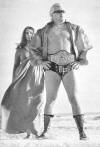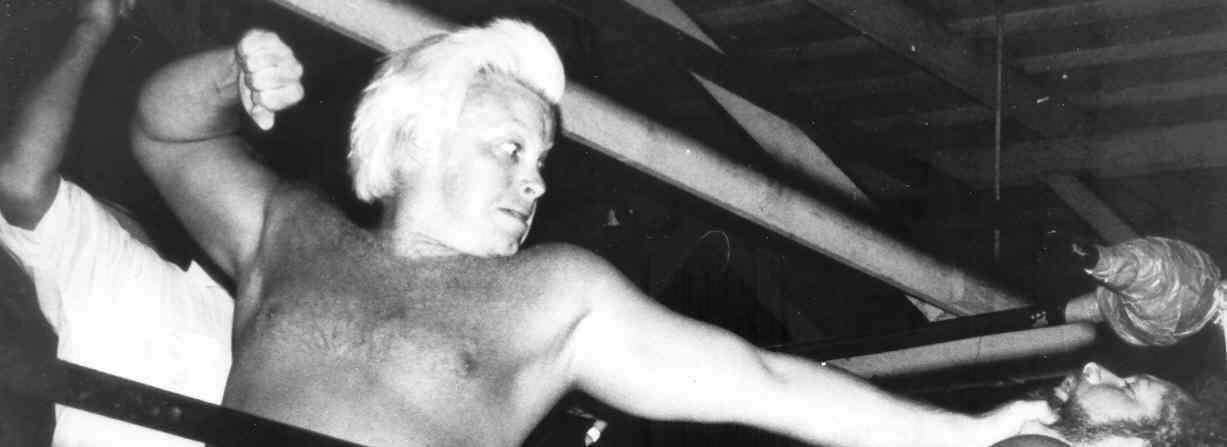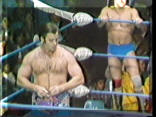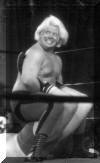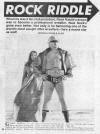|
  I
did literally hundreds of on-camera interviews during my
professional wrestling career. Being a “bad-guy,” of
course, I generally took control of that live television
time, even though I was the person supposedly being
interviewed. It was an interesting twist of fate a few
years ago, when I went from interviewee to interviewer.
My company, APS Entertainment, was taping interviews for
possible use in the opening and closing scenes of our
upcoming feature film, “When Wrestling Was Real”
(working title). I was interviewing my friend and
living legend, Playboy Buddy Rose. I knew it was going
to be a wild and crazy, fun interview. I assumed,
correctly, that it might be difficult for either of us
to keep a straight face, since Buddy and I both possess
the well-known pro wrestlers’ extreme sense of humor. I
did literally hundreds of on-camera interviews during my
professional wrestling career. Being a “bad-guy,” of
course, I generally took control of that live television
time, even though I was the person supposedly being
interviewed. It was an interesting twist of fate a few
years ago, when I went from interviewee to interviewer.
My company, APS Entertainment, was taping interviews for
possible use in the opening and closing scenes of our
upcoming feature film, “When Wrestling Was Real”
(working title). I was interviewing my friend and
living legend, Playboy Buddy Rose. I knew it was going
to be a wild and crazy, fun interview. I assumed,
correctly, that it might be difficult for either of us
to keep a straight face, since Buddy and I both possess
the well-known pro wrestlers’ extreme sense of humor.
Lighting was
adjusted, the overhead microphone was moved into place,
and tape was rolling. Playboy Buddy Rose walked into
frame, extending his hand. “Rock Riddle! How are
you?” I accepted his outstretched hand as we both
instinctively turned to face the camera. “It is,” I
began, utilizing my slightly exaggerated announcer’s
voice, “the one, the only … Playboy Buddy Rose!” “I’ve
known this guy,” Buddy began, pointing his finger
directly at me, “since the 1970s.” “Whoa, hold on
there, big guy,” I corrected. “I was born July 12th,
1973. So it had to be much later than that.” Except
for a slight “Yeah, right” half-smile-half-smirk, Buddy
ignored my statement. “You were in the AWA [American
Wrestling Association] driving that Karmann Ghia.
“That’s right,” I responded, a little surprised that he
remembered. “And you let me ride with you a couple of
times,” Buddy continued. The look on my face was
telling. I had no idea what he was talking about. I
had no recollection of his ever riding with me. The
only thing that came to mind for me to say at that point
was a questioning, “Yeah?”
 Buddy
must have detected my
I-don’t-know-what-you’re-talking-about-or-how-to-respond
look. He was like an excited kid who was happy to have
the Buddy
must have detected my
I-don’t-know-what-you’re-talking-about-or-how-to-respond
look. He was like an excited kid who was happy to have
the opportunity to tell me a great secret. “Yeah, you liked
to travel alone, but you let me ride with you that
time.” I still had a blank look on my face. He
continued his enthusiastic attempt to help me remember
something which, to him, apparently had great
significance. “It was a two-seater,” he continued.
“You had bleached blond hair. I was about your size and
you were about my size. Now, we’ve switched; now you’re
little and I’m big.” Buddy weighed at least 300 pounds
and I probably tipped the scales at about 195 as we were
doing the interview. “But you’re big, though,” Buddy
continued, “as far as ‘Look at you now.’ You’re the
star of the show.” “No,” I responded, “you are the star
of the show.” “No, you’re the star,” Buddy corrected,
“I’m only a guest.” “Oh, you are?” I asked, as though I
were confused, creating the foundation for a potential
comedy bit if Buddy wanted to “play.” We both smiled.
“I thought you were here to interview me!” I announced
to my long-time friend. Before I had completed the last
word of my statement, Buddy said, “NO!”
opportunity to tell me a great secret. “Yeah, you liked
to travel alone, but you let me ride with you that
time.” I still had a blank look on my face. He
continued his enthusiastic attempt to help me remember
something which, to him, apparently had great
significance. “It was a two-seater,” he continued.
“You had bleached blond hair. I was about your size and
you were about my size. Now, we’ve switched; now you’re
little and I’m big.” Buddy weighed at least 300 pounds
and I probably tipped the scales at about 195 as we were
doing the interview. “But you’re big, though,” Buddy
continued, “as far as ‘Look at you now.’ You’re the
star of the show.” “No,” I responded, “you are the star
of the show.” “No, you’re the star,” Buddy corrected,
“I’m only a guest.” “Oh, you are?” I asked, as though I
were confused, creating the foundation for a potential
comedy bit if Buddy wanted to “play.” We both smiled.
“I thought you were here to interview me!” I announced
to my long-time friend. Before I had completed the last
word of my statement, Buddy said, “NO!”
 After
a few moments of comedic back-and-forth banter, Buddy
decided to become, at least temporarily, semi-serious.
He looked into the camera, pointed once again to me,
even though I was only a few inches away from him, and
decided to share his thoughts with the fans there at the
taping and with all who would view the “show” later.
“Rock Riddle’s a great guy. He asked me to do this
interview,” Buddy explained. He directed his attention
back towards me as he continued, “I want to talk about
anything you want to talk about, Rock.” Because I was
interviewing one of my fellow wrestlers, I was intent on
having fun with the interview. I knew we would
eventually get serious, but not quite yet. To set Buddy
up for a little joke, as we wrestlers so frequently do,
I decided to ask him a question totally unrelated to
wrestling. “Okay,” I responded, “Then, I would like to
ask you a question.” “Sure,” he said. With a sincere
and serious expression on my face, I looked Buddy in the
eyes and asked, “What is the airspeed velocity of an
unladen swallow?” By the momentary lack of expression
on his face, I knew I had “got him.” But, Buddy was
always wonderful on the microphone, a total pro, and I
knew he would quickly turn the tables on me. It took
about one second for Buddy to respond. He rolled his
eyes slightly, directed his attention to the audience
and “explained” my question. “His facility for the
jocular repulse,” Buddy began, referring to me, “and his
mastery of his droll repartee doesn’t strike the
measured risibility in me.” “Okay,” I said to
myself, “maybe it is
time to get serious.” After
a few moments of comedic back-and-forth banter, Buddy
decided to become, at least temporarily, semi-serious.
He looked into the camera, pointed once again to me,
even though I was only a few inches away from him, and
decided to share his thoughts with the fans there at the
taping and with all who would view the “show” later.
“Rock Riddle’s a great guy. He asked me to do this
interview,” Buddy explained. He directed his attention
back towards me as he continued, “I want to talk about
anything you want to talk about, Rock.” Because I was
interviewing one of my fellow wrestlers, I was intent on
having fun with the interview. I knew we would
eventually get serious, but not quite yet. To set Buddy
up for a little joke, as we wrestlers so frequently do,
I decided to ask him a question totally unrelated to
wrestling. “Okay,” I responded, “Then, I would like to
ask you a question.” “Sure,” he said. With a sincere
and serious expression on my face, I looked Buddy in the
eyes and asked, “What is the airspeed velocity of an
unladen swallow?” By the momentary lack of expression
on his face, I knew I had “got him.” But, Buddy was
always wonderful on the microphone, a total pro, and I
knew he would quickly turn the tables on me. It took
about one second for Buddy to respond. He rolled his
eyes slightly, directed his attention to the audience
and “explained” my question. “His facility for the
jocular repulse,” Buddy began, referring to me, “and his
mastery of his droll repartee doesn’t strike the
measured risibility in me.” “Okay,” I said to
myself, “maybe it is
time to get serious.”

“What I would like to do,” I explained, “is to let
people know what wrestling was like before it became the
carnival-type event that it is today.” Buddy quickly
jumped in, adding,
“with all due respect to the wrestlers who are there and
do know how to ‘work’ [wrestle] and who have to work
that style. I mean, the Shawn Michaels, the Ric
Flairs.” “Absolutely!” I agreed. Buddy continued,
“They were in our era. I mean, they’re making good
money. They’ve got
to go 6, 7 minutes per night, hey, why not take it?”
“Hey, why not?” I concurred.
“I’d like to be able to show the younger people, the
people under thirty, who never experienced it, how and
what professional wrestling really was,” I explained.
“I’d like to take them into that world and allow them to
understand our ‘wrestling family’ and lifestyle. What
insight would you like to share with us?” Buddy was
happy to be able to shed light on a way of life that was
absolutely extraordinary. “It was 365 days a year,” he
began, “seven nights a week. It felt funny if you had a
day off. ‘Double shots’ [wrestling twice in two
different towns in one day] on the weekends. Maybe a
one o’clock show in the afternoon, and then get on an
airplane or drive to the next town, and you wrestled
that night. There was no home life in a lot of the
territories [sections of the country governed by a
specific wrestling promotion] for a lot of the
wrestlers. I was fortunate enough to wrestle in the
Northwest after I left Minneapolis. In the Northwest,
you could be home every night. But there were
territories like Charlotte and Dallas and Amarillo and
in Florida… I could go on and on… you were only home a
couple nights a week. If you had a family, you
sacrificed a lot. If you had a good wife who totally
supported you, which I have standing here off camera,
you could make it through anything. Again, I was so
fortunate to be able to work the Northwest. I could be
home every night, and that’s one reason I stayed there
so long.”

Next week, we’ll continue with Playboy Buddy Rose. He
will relate his experiences wrestling all over the
world. We will discuss how tough the sport was and how
and why we all wrestled when we were hurt. We will
share true wrestling
stories with you and provide a good deal of insight and
“inside information.”
Until
then, keep those e-mails coming. |
